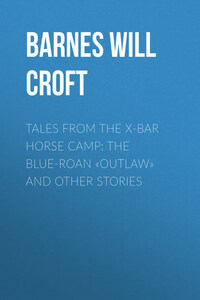A Tale of the "Hashknife" Range
By permission The Breeder's Gazette, Chicago, III
"Say, Bill, there's that old blue-roan, droop-horned cow that allus runs over on the Coyote wash. Reckon she ain't got a calf somers' hereabout?"
"Like as not," replied Bill, "an' I'll bet it's a blue-roan, too, for she's raised a blue calf reg'lar fer these last four or five years. There's a little hole of water clos't to where she's a-grazin' an' it's a sure shot the calf's hid away in that tall grass down there clos't to it."
The two cowboys rode slowly down the gentle slope toward the cow, which watched them eagerly, but with the cunning of the brute made no sign or motion to show where her baby was hidden. When, however, one of the boys played the time-worn trick on her by barking like a dog, it was too much for her peace of mind. With a mad bellow of defiance she raced toward the spot where the little fellow was hidden, exactly as the boys knew she would.
The calf, with the instinct of the brute already working in his little four-day-old brain, did not move, but lay there as quietly as if he were dead, and, not until the horsemen rode almost onto him in the deep grass, did they discover his hiding place.
The mother, with the fear of man too strong in her heart to stand by her guns, ran off a few yards from the spot and the calf followed, bawling loudly, the already awakened man-fear strong within him.
"He's a sure blue-roan all right," said Bill. "Say, won't that old Hashknife iron loom up big on them ribs some day?" he asked, for a brand on a roan animal shows much more plainly than on a hide of any other color.
"It sure will," replied his companion; "better leave 'em here till tomorrow an' we can swing around this a-way an' git 'em."
So the boys rode on across the prairie, and the droop-horned blue with her baby rested in peace that day and night.
It was here, away out on the "staked plains," those mysterious regions of the great Southwest, and far back from the thin line of settlements that fringed the Pecos River, in southeastern New Mexico, that the "blue-roan outlaw" first saw the light.
Early next morning the leaders of the roundup party, engaged in gathering up the cattle on the range, swung across the prairie in a great semicircle, sweeping before them in one huge drive, everything of the cow kind. As they divided up into couples to work down the country, the leader said: "Bill, you look out an' catch that ole blue-roan we seen yistiday. The old man wants all them cows to throw into that Arizony drive, an' her an' the calf will make it in all right, I reckon."
So, as they rode along, Bill swung across a little draw toward the water hole they had seen the day before. He picked up the blue-roan, who, with her young son beside her, trotted off, following the rest of the cattle already working down the trails toward the round-up grounds. The two animals fell in with more of their kind as the trails converged until, by the time the roundup ground was reached, there were more than fifteen hundred cattle of all ages and sexes gathered in one great bunch.
The blue-roan's baby kept close to his mother's side; the dust that settled over the herd like a pall, choking him, while the constant bawling of the cattle, fairly deafened him.
Once, when two huge bulls, fighting fiercely, drove through that portion of the herd where he and his mother were, and separated the little family, he added to the din by raising his voice in pitiful outcry for his protector.
Outside of the herd the cowboys rode slowly around, turning back into the center any stragglers that tried to escape.
Gradually the bunch began to stop "milling" and as cow after cow found her calf, the bawling stopped. In half an hour the herd was fairly quiet and the wagon boss dropped off his horse to "cinch up" a little, preparatory to the work of cutting out.
Having reset his saddle, the boss mounted again and, calling to two other men near him, said, "Jack, you go out there a ways and hold 'em up, and Charley and I will get out the cows and the calves." So Jack rode off about one hundred yards from the herd in readiness to receive the "cut" as they came out; while the boss and Charley rode slowly into the mass of cattle.








